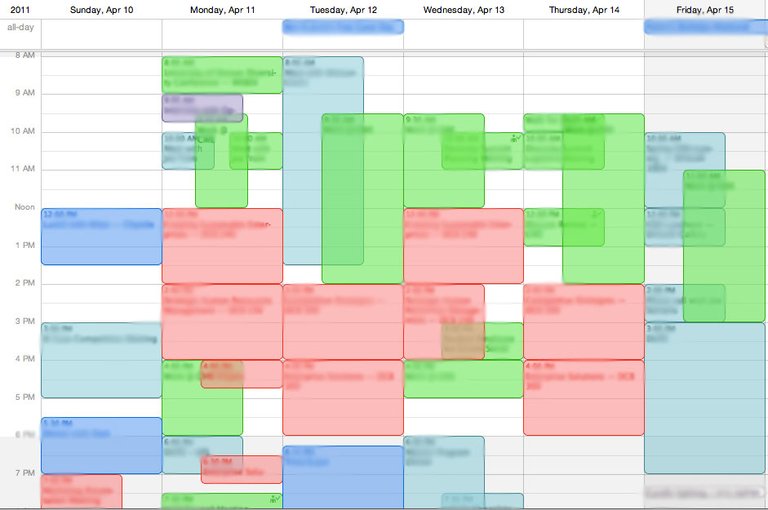
How much free time do you have?
A few years back (almost a decade ago... wow how time flies!), I was a young project manager at a corporation. As a middle manager, I usually lead several projects at the same time. Some bigger, some smaller. I remember one time I was getting ready to assign resources to a new project, so I emailed my team and asked everybody to make one slide for the following week's team meeting with a chart that described what projects they are working on, in what percentage and what percentage of free time everybody had.
I had already made the chart for myself and it looked something like this:

There where some projects that started at the beginning of the year and then started winding down. Some where shorter, so I'd be done with them by the end of Q1 and around mid Q2 I'd start to have more free time to pick up new projects.
"Pretty straightforward" I thought.
However, when I got my team's charts, guess what they looked like

That's right. Everybody reported being 100% busy every week, every month, every quarter for the rest of the year.
Serves me right for not seeing it coming, right? 😄
I did learn something though. That people want to seem busy in the office space and having free time in your schedule is a big no-no. It's almost seen as a corporate capital sin or something.
In fact, employees will do lots of activities that seem productive, but aren't, like:
- Calls
- Sitting at your desk when you're not working
(things that look like work)
And will overlook a bunch of activities that ARE productive, but don't realize, like
- Dinners with colleagues
- Walks
- Attending events
- Travel
- Reading
- Listening to music
- Working out
- Meditation
( Things that don't look like work)
Some of the most productive conversations for me have come out of having dinner and drinks with my smart friends, but what do you think my corporate boss's response would have been if I asked for a budget for "dinner and drinks with smart friends" so I can come up with ideas?
Or what If you requested an hour of your day to lay on a beanbag and read a book? Would people look at you weird because you're wasting time not being busy?
What about learning about other, unrelated industries?
Is it because we focus too much on the metrics?
Yes, businesses need metrics: unit sales, cost of serving, quarterly budgets, etc. But what if we're so caught up in the metrics that we don't allow ourselves to spend any time with innovation?
We focus on results, KPIs, making things happen...
What if we even start to develop our own individual metrics that signal how important or busy we are?
Does it really matter if my email inbox is completely empty or worse, if my email inbox has 100 unread emails because I'm Crazy busy!
Does it really matter if our calendar looks like this:

My anecdote in the opening paragraph goes to show that even if we're not busy, our productivity obsession often leads us to fill up our free time with distractions and compulsive behavior like checking our devices.
I say: embrace unstructured time to come up with ideas
Now that I get to call the shots on how I spend my day, I say "bah humbug" to the idea of needing to look busy in the office.
You need unstructured time in your day to think and come up with ideas. You need to commit to reading time, walking time, workout time or simply time to gaze out the window and step away from complex here-and-now problem solving to step inward into your world of idea creation. There is always going to be an urgent invoice, a call, an instant message that will push aside your thinking time, your creative time, your idea time.
Stephen Covey organizes our daily, weekly and monthly activities into four quadrants, and they look like this:

Quadrant 1 - Important and urgent
In business and in life, problems will occur. Things that need immediate attention (urgent) and are important too. But this is why we are leaders too, right? we can help find the solution to these problems by delegating them to the most appropriate teams or individuals. Sometimes we may need to hire some external help. But these types of activities need to be MANAGED.
Quadrant 2 - Important but not urgent
These activities are about planning and strategic and critical thinking. You should FOCUS on these kinds of activities and as I stated above, always make time for them.
This is where I would put unstructured time to come up with ideas.
Quadrant 3 - Urgent but not important
There are a lot of these today. Activities that have a sense of urgency, like an incoming phone call, but are actually just interruptions. Busy work, like invoices that aren't due yet and WhatsApp group chat conversations. We should try to AVOID these types of activities.
Quadrant 4 - Neither urgent nor important
These are mostly just wasteful activities and one should try to LIMIT the amount of them that make it into your daily schedule.
We'll always have activities from every quadrant in our life, but I say we should make time in our schedule for quadrant 4 activities. They might now show up in the every day metrics, but it's where amazing ideas come from.
I'd love to read your thoughts.

Posted Using InLeo Alpha
It is very hard to believe that a person can be busy every day for 6 months haha. This has happened in a very rare period of my life. Of course I'm not accusing anyone of lying but it seems strange.
On the other hand, you categorized things the right way man, even if some people can't put the right context to it. I hope I made my point.
Nobody is 100% busy every day for 6 months hahaha. It just goes to show that in certain work cultures, free time is seen as negative. So much so, that people will hide free time and even fill it up with made up activities.
Time is awesome. Project management is great, and everyone has to be seen to be busy. I remember when I started out as a Chemical Engineer my first boss would put his feet up for the first half hour of every day reading magazines. This was him doing research and that always stuck with me, allocate time wisely.
When things are fun of course you fly through them!
Have a great week.
Yes! You'd think he's got his feet up "doing nothing". But I'm sure he also got some great ideas from these doing nothing sessions. I'm all for productivity man, but I also think we must embrace unstructured time to connect with our ideas and feelings.
Have an awesome week!
Having worked in corporate as well, I think it depends on the type of work. If I work in IT DBA, and ask for funds for dinner with friends, then I also won't get approval. That is because management only cares about things that directly relate to my work. They don't care about my mental health or stress, maybe only up to a point. But managers and procurement that have lunches with vendors can easily get funds, since they can say it is work related. I think it is a matter of being creative with it.
For an IT DBA, it is looking for Trainings where they can skip out a bit on their work. These trainings are paid for by the company, you get to relax and learn outside of the company, and the lunches and snacks are paid for.
Stephen Covey's quadrants are helpful. In a busy workplace, I think being in a non-toxic work environment is important. Being friendly with coworkers can be helpful, and having drinks or dinners with friends from time to time is good.
Yes, you're right. Budgets to take clients and vendors out to dinner is one thing, but perhaps I'm talking about time to create, to innovate, to come up with ideas.
Businesses often need creative spaces to develop new products or drive innovation. Other times (or maybe other areas of the business ) we focus on efficiency.
Walks, conversations, activities that often seem like we're "doing nothing" are often what sparks creativity and innovation.
Yeah I agree. Unfortunately, not a lot of companies provide that to their employees. I have seen some about Google, and a few employer posts here on Hive. Some even have guidelines like no lunch on workstations, to force employees to get up, maybe eat with coworkers, and have conversations with others.
Nowadays what I am always trying to do is to make strategic use of my time in engaging in productive things as it helps to command more result
No activity should be overlooked because they cost people a lot. No matter how simple or how fun they activity may be, it still cost people their leisure time, time they can spend their own and all sorts of things but unfortunately, some companies overlook those activities
Majority of people did not understand the fact that we are actually leaders on our own and not for when we enter position